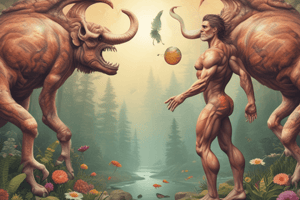Podcast
Questions and Answers
What is evolution?
What is evolution?
Genetic change in a population over time
Which of the following are misconceptions about evolution? (Select all that apply)
Which of the following are misconceptions about evolution? (Select all that apply)
- Evolution is a theory about the origin of life (correct)
- Evolution is not science because it is not observable (correct)
- Organisms are always getting bigger and better (correct)
- Natural selection is just random chance (correct)
What is adaptation?
What is adaptation?
A trait with a current functional role maintained by natural selection
What is natural selection?
What is natural selection?
What is genetic drift?
What is genetic drift?
What are mutations?
What are mutations?
Who was James Hutton?
Who was James Hutton?
Who was Carolus Linnaeus?
Who was Carolus Linnaeus?
Who was Jean Baptiste de Lamarck?
Who was Jean Baptiste de Lamarck?
Who was Thomas Malthus?
Who was Thomas Malthus?
Who was George Cuvier?
Who was George Cuvier?
Who was Charles Lyell?
Who was Charles Lyell?
Who was Alfred Wallace?
Who was Alfred Wallace?
Who was Charles Darwin?
Who was Charles Darwin?
What adaptations did Darwin focus on?
What adaptations did Darwin focus on?
What concepts come from 'On the Origin of Species'?
What concepts come from 'On the Origin of Species'?
What is competition in biology?
What is competition in biology?
What is variation in evolutionary terms?
What is variation in evolutionary terms?
What is heritability?
What is heritability?
What is differential reproduction?
What is differential reproduction?
What is artificial selection?
What is artificial selection?
What are direct observations of evolution?
What are direct observations of evolution?
What are fossil records of evolution?
What are fossil records of evolution?
What is convergent evolution?
What is convergent evolution?
What are vestigial structures?
What are vestigial structures?
What is biogeography?
What is biogeography?
What is continental drift?
What is continental drift?
What does endemic refer to?
What does endemic refer to?
Flashcards are hidden until you start studying
Study Notes
Evolution
- Evolution is defined as genetic change in a population over time.
- Common misconceptions include viewing evolution as a theory solely about life's origins and misunderstanding natural selection as a purposeful process.
Adaptation and Natural Selection
- Adaptation refers to traits that enhance an organism's survival and reproductive success, shaped by natural selection.
- Natural selection is a gradual process where biological traits become more or less common based on reproduction rates.
Genetic Concepts
- Genetic drift is the change in allele frequency within a population due to random sampling effects.
- Mutations are changes in the genomic sequence that can drive evolution.
Historical Figures in Evolutionary Biology
- James Hutton is recognized as the father of geology, proposing that geological features develop gradually.
- Carolus Linnaeus is known as the father of taxonomy, responsible for the system of binomial nomenclature.
- Jean Baptiste de Lamarck introduced the principles of use and disuse and inheritance of acquired characteristics.
- Thomas Malthus explored the idea of population limits, stating that every population has a carrying capacity.
- George Cuvier contributed to paleontology and the concept of catastrophism, suggesting geological changes occur due to catastrophic events.
- Charles Lyell expanded on Hutton’s ideas through uniformitarianism, promoting the notion that geological processes occur at the same rate over time.
- Alfred Wallace, a British naturalist, independently discovered the principles of natural selection and acknowledged Darwin's contributions.
- Charles Darwin, known for his work "On the Origin of Species," developed key concepts of evolution and natural selection.
Key Evolutionary Concepts
- Adaptations can be behavioral, structural, biochemical, or physiological, enhancing survival and reproduction.
- Descent with modification describes the gradual change of organisms over time.
- Variation is integral to evolution; dominant traits arise based on environmental success.
- Heritability ensures that advantageous traits are passed to successive generations.
- Differential reproduction results in individuals with favorable traits producing more offspring.
Selection Mechanisms
- Artificial selection involves breeding domesticated plants and animals for desired traits.
- Direct observations of evolution can be seen in cases like guppy coloration changes and the emergence of drug-resistant HIV.
Fossil Records
- Fossil records document the history of life on Earth, with prokaryotic cells being the earliest known fossils.
- Trace fossils, such as footprints, and rare whole organism fossils provide insight into ancient life forms.
Evolutionary Processes
- Convergent evolution leads to the development of similar traits in unrelated lineages.
- Vestigial structures are remnants of features that had significant functions in ancestral organisms.
Geographic and Geological Context
- Biogeography studies the geographic distribution of organisms, providing context to evolution.
- Continental drift describes the slow movement of Earth's continental plates, influencing species distribution.
- Endemic species are confined to specific, often small geographic regions, illustrating unique evolutionary paths.
Studying That Suits You
Use AI to generate personalized quizzes and flashcards to suit your learning preferences.




